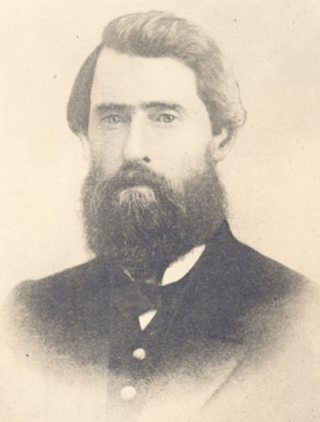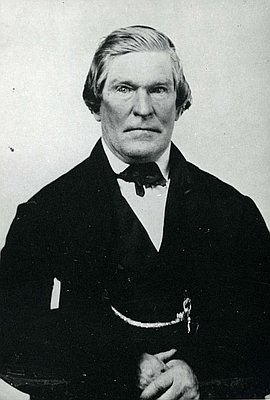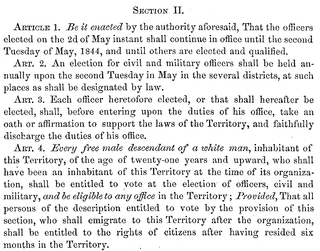Related Research Articles

John McLoughlin, baptized Jean-Baptiste McLoughlin, was a French-Canadian, later American, Chief Factor and Superintendent of the Columbia District of the Hudson's Bay Company at Fort Vancouver from 1824 to 1845. He was later known as the "Father of Oregon" for his role in assisting the American cause in the Oregon Country. In the late 1840s, his general store in Oregon City was famous as the last stop on the Oregon Trail.

Jason Lee was a Canadian Methodist Episcopalian missionary and pioneer in the Pacific Northwest. He was born on a farm near Stanstead, Quebec.

George Abernethy was an American politician, pioneer, notable entrepreneur, and first governor of Oregon under the provisional government based in the Willamette Valley, an area later a part of the American state of Oregon. He traveled to Oregon Country as a secular member of the Methodist mission, where he became involved in politics and helped found the first American newspaper west of the Rocky Mountains.

Philip Foster was one of the first settlers in Oregon, United States. The farmstead he established in Eagle Creek in 1847 became a stopping post for pioneers heading west along the Oregon Trail. Approximately 10,000 emigrants are believed to have passed through. The farm was listed on the National Register of Historic Places in 1980.

Asa Lawrence Lovejoy was an American pioneer and politician in the region that would become the U.S. state of Oregon. He is best remembered as a founder of the city of Portland, Oregon. He was an attorney in Boston, Massachusetts before traveling by land to Oregon; he was a legislator in the Provisional Government of Oregon, mayor of Oregon City, and a general during the Cayuse War that followed the Whitman massacre in 1847. He was also a candidate for Provisional Governor in 1847, before the Oregon Territory was founded, but lost that election.

Francis William Pettygrove was a pioneer and one of the founders of the cities of Portland, Oregon, and Port Townsend, Washington. Born in Maine, he re-located to the Oregon Country in 1843 to establish a store in Oregon City. Later that year he paid $50 for half of a land claim on which he and Asa Lovejoy laid out a town named Portland after the port city in Pettygrove's home state. Lovejoy preferred Boston, but Pettygrove won a coin toss giving him the right to choose the name.

The Champoeg Meetings were the first attempts at formal governance by European-American and French Canadian pioneers in the Oregon Country on the Pacific Northwest coast of North America. Between 1841 and 1843, a series of public councils was held at Champoeg, a settlement on the French Prairie of the Willamette River valley in present-day Marion County, Oregon, and at surrounding settlements. The meetings were organized by newly arrived settlers as well as Protestant missionaries from the Methodist Mission and Catholic Jesuit priests from Canada.

Oregon pioneer history (1806–1890) is the period in the history of Oregon Country and Oregon Territory, in the present day state of Oregon and Northwestern United States.

Jesse Applegate was an American pioneer who led a large group of settlers along the Oregon Trail to the Oregon Country. He was an influential member of the early government of Oregon, and helped establish the Applegate Trail as an alternative route to the Oregon Trail.
Ewing Young was an American fur trapper and trader from Tennessee who traveled in what was then the northern Mexico frontier territories of Santa Fe de Nuevo México and Alta California before settling in the Oregon Country. Young traded along the Santa Fe Trail, followed parts of the Old Spanish Trail west, and established new trails. He later moved north to the Willamette Valley. As a prominent and wealthy citizen in Oregon, his death was the impetus for the assemblies that several years later established the Provisional Government of Oregon.

The Oregon Spectator, was a newspaper published from 1846 to 1855 in Oregon City of what was first the Oregon Country and later the Oregon Territory of the United States. The Spectator was the first American newspaper west of the Rocky Mountains and was the main paper of the region used by politicians for public debate of the leading topics of the day. The paper's motto was Westward the Star of Empire takes its way.

The Provisional Government of Oregon was a popularly elected settler government created in the Oregon Country, in the Pacific Northwest region of North America. Its formation had been advanced at the Champoeg Meetings since February 17, 1841, and it existed from May 2, 1843 until March 3, 1849, and provided a legal system and a common defense amongst the mostly American pioneers settling an area then inhabited by the many Indigenous Nations. Much of the region's geography and many of the Natives were not known by people of European descent until several exploratory tours were authorized at the turn of the 18th and 19th centuries. The Organic Laws of Oregon were adopted in 1843 with its preamble stating that settlers only agreed to the laws "until such time as the United States of America extend their jurisdiction over us". According to a message from the government in 1844, the rising settler population was beginning to flourish among the "savages", who were "the chief obstruction to the entrance of civilization" in a land of "ignorance and idolatry".

The Provisional Legislature of Oregon was the single-chamber legislative body of the Provisional Government of Oregon. It served the Oregon Country of the Pacific Northwest of North America from 1843 until early 1849 at a time when no country had sovereignty over the region. This democratically elected legislature became the Oregon Territorial Legislature when the territorial authorities arrived after the creation of the Oregon Territory by the United States in 1848. The body was first termed the Legislative Committee and later renamed the House of Representatives. Over the course of its six-year history the legislature passed laws, including taxation and liquor regulation, and created an army to deal with conflicts with Native Americans.

William Green T'Vault (1806–1869) was a pioneer of the Oregon Country and the first editor of the first newspaper published west of the Missouri River. T'Vault led a wagon train of 300 that arrived in Oregon in 1845, after traveling on the Meek Cutoff, a branch of the Oregon Trail. He settled in Oregon City, and was appointed Postmaster General by the Provisional Government of Oregon.

The Organic Laws of Oregon were two sets of legislation passed in the 1840s by a group of primarily American settlers based in the Willamette Valley. These laws were drafted after the Champoeg Meetings and created the structure of a government in the Oregon Country. At the last Champoeg Meeting in May 1843, the majority voted to create what became the Provisional Government of Oregon. Laws were drafted by the committee and accepted by a popular vote in July. These laws were reformed by a second version in 1845.

The Oregon Constitutional Convention in 1857 drafted the Oregon Constitution in preparation for the Oregon Territory to become a U.S. state. Held from mid-August through September, 60 men met in Salem, Oregon, and created the foundation for Oregon's law. The proposal passed with a vote of 35 for adoption to 10 against. Oregon then became the 33rd state of the Union on February 14, 1859.
Henry A. G. Lee was a soldier and politician in Oregon Country in the 1840s. A member of Virginia's Lee family, he was part of the Fremont Expedition and commanded troops during the Cayuse War in what became the Oregon Territory. He also was a member of the Oregon Provisional Government and the second editor of the Oregon Spectator.
Albert E. "A.E." Wilson was an American pioneer and merchant in Oregon Country. Raised in the United States, he moved to what would become the U.S. state of Oregon where he operated stores, was involved in politics, and was elected as the first judge of the Provisional Government of Oregon.

Lindsay Applegate was an American pioneer known for his participation in blazing the Applegate Trail, an alternative route of the Oregon Trail. The trail was blazed with his brothers Charles and Jesse in 1846, though Charles was not a member of the party that blazed the section of the Applegate Trail from the Willamette Valley to the Humboldt River. According to an original manuscript written by Lindsay Applegate in 1877, the members of the expedition were: Capt. Levi Scott, John Scott, Henry Boygus, Lindsay Applegate, Jesse Applegate, Benjamin Burch, John Owens, John Jones, Robert Smith, Samuel Goodhue, Moses "Black" Harris, David Goff, Benit Osburn, William Sportsman, and William Parker.

John Turner was an American fur trapper and guide who first entered Oregon Country in 1828 and became an early resident of the Willamette Valley. Later he moved to California where he was part of the second attempt to rescue the Donner Party.
References
- 1 2 3 Heinzkill, Richard (August 1993). "A Brief History of Newspaper Publishing in Oregon". University of Oregon Libraries. Retrieved 2007-02-11.
- 1 2 3 4 5 Kohnen, Patricia. "Clackamas County, 1800 to 1843". AT THE END OF THE TRAIL: An Introduction to Clackamas History. Retrieved 2007-02-11.
- ↑ "Oregon Secretaries of State Biographical Sketches, 1841-Present". Oregon Blue Book. Oregon Secretary of State. Retrieved 2007-02-11.
- 1 2 Kidd, Julie. "Pettygrove". Multnomah County, Oregon GenWeb. Retrieved 2007-02-11.
- 1 2 3 Corning, Howard M. Dictionary of Oregon History. Binfords & Mort Publishing, 1956.
- ↑ Bancroft, Hubert Howe. 1882. The works of Hubert Howe Bancroft. San Francisco: A.L. Bancroft & Co. p. 297
- 1 2 3 4 5 6 Hines, Joseph Wilkinson. "CHAPTER VIII. The Provisional Government". Touching incidents in the life and labors of a pioneer on the Pacific coast since 1853. Library of Congress. Retrieved 2007-02-11.